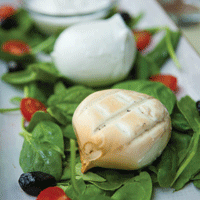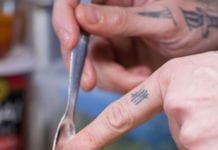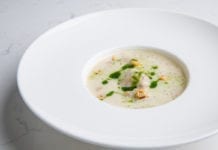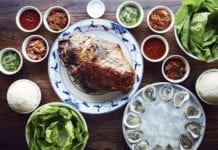Obikà brings Italy’s famed Mozzarella di Bufala Campana to Canada
Anyone hurrying through the towering glass atrium of Brookfield Place in Toronto’s downtown business district would be forgiven for thinking Obikà Mozzarella Bar, one of the newest restaurants in the complex, is a sushi bar. First there’s that big name on the sign, with its seeming Japanese inflection and evocative mock-ink brush font; then there’s the restaurant’s layout in the atrium’s courtyard, featuring a glass-fronted eating counter where diners can watch chefs prepare the food. The chefs themselves wear traditional waboshi — those stubby sushi-chef hats.
But a quick double-take at the slightly smaller print on the signage confirms Obikà, which opened last May, is anything but Japanese. This, as the sign says, is a “mozzarella bar,” Canada’s first and part of a chain that has been winning fans worldwide with a menu built around one of Italy’s most prized exports, Mozzarella di Bufala Campana.
“We made a fusion between Japanese design and Italian food,” says Lorenzo Sibio, president of Obikà Canada. “The minimalist design gives us the opportunity to showcase our food as the most important part of our business.”
Made from the milk of water buffalo, Mozzarella di Bufala Campana is an artisanal cheese that has been manufactured by traditional methods for centuries in Campania, a province on the Italian boot’s shin. “Mozzare” in Italian means to “lop off,” and the word mozzarella refers to the process in which the cooked curd is kneaded by hand into a paste from which pieces are lopped off and shaped into balls. This cheese is flown in fresh twice weekly from Campania for Obikà (whichmeans ecco qua, or “here it is,” in Neapolitan). Porcelain white, the cheese is soft, moist and spongy. It has a milky flavour, salty from the brine in which it is stored and characterized by a mild grassiness, reflective of the terroir of the pastures where the buffalo graze.
In Italy, the cheese has had “Denominazione di origine controllata” (DOC) status, meaning “Controlled Designation of origin,” since 1993, and its production and marketing are closely monitored by a governing consortium. No other mozzarella may legally call itself by the trademarked name of Mozzarella di Bufala Campana. This stuff is to mozzarella what Champagne is to sparkling wine.
“We have three types at Obikà,” says Sibio, a Toronto native of Italian heritage who previously worked in the international hotel business for 10 years. “One is the stracciatella di burrata, another is the afumicata, which is smoked in a hay oven, and then there’s the classica.” Stracciatella di burrata is a particularly rare specialty consisting of a shell of mozzarella stuffed with a mixture of the shredded cheese and fresh cream.
These cheeses are best experienced plain, with a little side salad or some olives; one of the most popular items at Obikà is a sampler plate “for two” of all three varieties. Obikà’s menu also features cheeses in an assortment of Italian dishes, including pizzas, salads and pastas. One of the more unusual preparations are sushi-like rolls made from flat sheets of mozzarella and filled with ingredients such as prosciutto, smoked salmon or radicchio.
The creative force behind the restaurants is a man named Silvio Ursini, an executive vice-president of Bulgari Hotels and Resorts, who launched Obikà in Rome in 2004. While he remains president and director of the Obikà chain, in 2010, a 52-per-cent stake was sold (for an undisclosed amount) to the London-based NEO Capital LLP, an investment fund specializing in European-branded consumer goods and services. In a December 2010 press release announcing the deal, NEO indicated its intent to accelerate the concept’s growth, defining its target market as premium retail and residential neighbourhoods, business districts and airports. Obikà saw reported sales of approximately €20 million internationally in 2010. Including Toronto, the chain currently has 17 locations in cities such as Milan, London, Istanbul, New York and Tokyo.
“Toronto is a city that is becoming very cosmopolitan,” says Sibio, “the demographics are changing and concepts like ours are very well received.”
In Canada, Sibio has his eye on further expansion. “We’re focusing on this one right now, being two months old, it’s very much in its opening stages,” he said in the summer. When the time comes, Sibio will be directly involved with every Canadian location. “We don’t sub-franchise,” he says. “That’s something we believe in. You can expand, but you make sure that you don’t dilute and that you maintain the integrity.”
All of Obikà’s locations were designed by the Rome-based architecture firm Labics. The Toronto store occupies the southeast corner of Brookfield Place’s famous cathedral-like atrium, itself designed by renowned Spanish architect Santiago Calatrava. About three-quarters of its 110 seats — including the eating counter and a long, raised communal table — are in the courtyard of the atrium, which bustles with business folk and tourists alike (the Hockey Hall of Fame is located next door). An “inside” space behind glass walls holds 10 tables and a private room for 12 that looks onto Yonge Street. Fixtures and furniture include dark-oak cabinetry, stackable Imperial chairs, blond-wood tables laminated with maps of Italy, raw-iron detailing and punchy colour accents from red napkins and menu folders. There’s a pizza oven in the open kitchen inside, and the courtyard boasts a 20-metre olive tree.
“I feel privileged every day to work inside a piece of Calatrava architecture,” says Sibio, standing under the tree and gazing up into the arched steel-and-glass atrium. “One of the greatest compliments we get here is that we’ve recreated the feel of an Italian piazza.”
Yes, that and a little bit of Japan, too.
photo courtesy of May Truong
More in Feature Articles:
Rising to The Challenge: Discovering New Grains for Your Foodservice Operation
Key to Foodservice Success: Find and Retain Top-Notch Staff
Pick of the Crop: Operators Weigh In on Their Kitchen Must-Haves





















